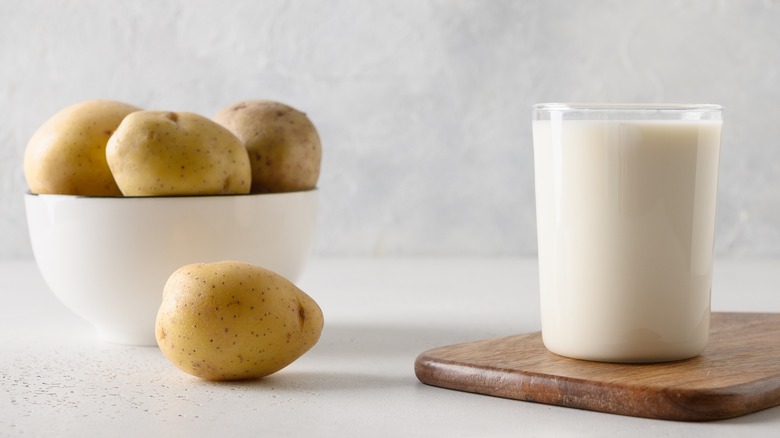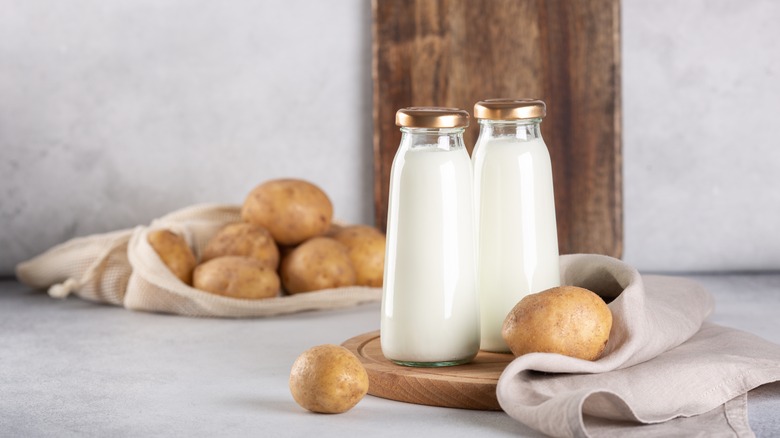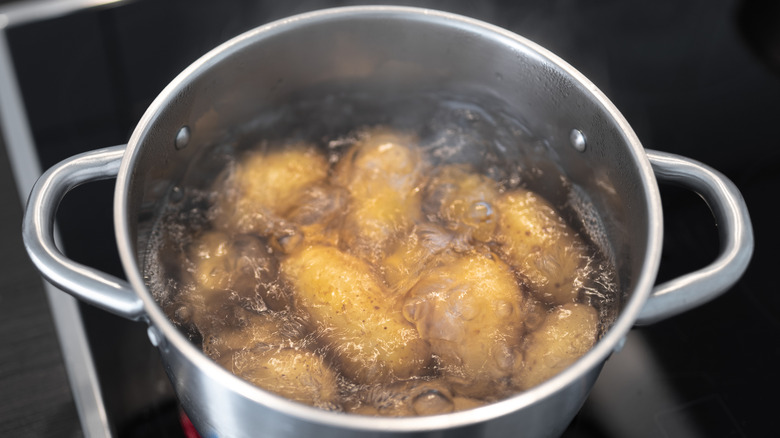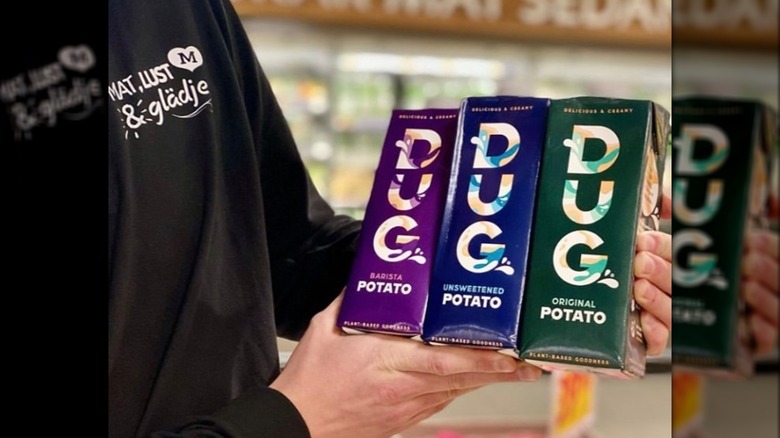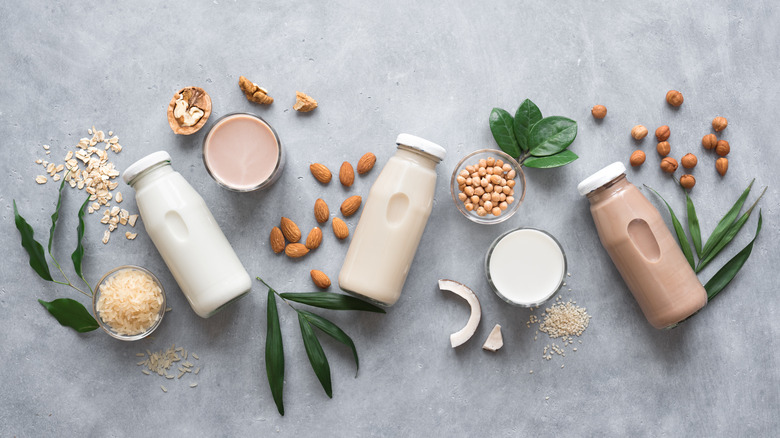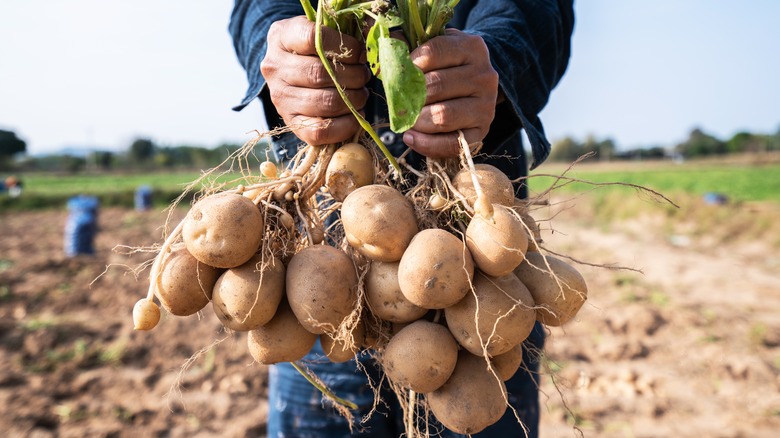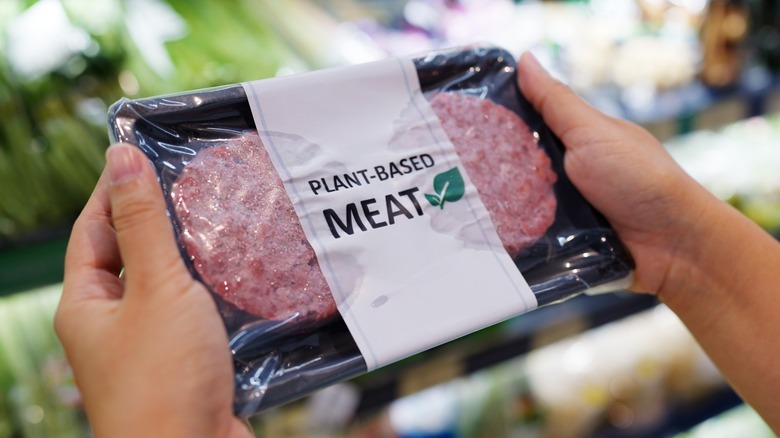Everything You Need To Know About Potato Milk
There are so many reasons one might choose an alternative to traditional cow's milk. For instance, many food specialists around the world agree that food allergies and intolerances are on the rise, though no one can quite say why (via BBC). Among the most common food allergies are an allergy to cow's milk, and this is in addition to the huge swaths of certain populations — such as African, Asian, Hispanic, and Native American/First Nations — who are already prone to lactose intolerance.
The more environmentally conscious consumers may also point to the negative effects that dairy farms can have on our air and water supplies. Despite efforts by farmers to minimize their impacts, dairy cows remain one of the largest sources of pollution.
With this in mind, it is a good thing that there are so many plant-based milk alternatives available. Your choice may depend on dietary requirements or just personal taste preferences, but soy milk, coconut milk, rice milk, hemp milk, oat milk, and milk made from just about any nut you can imagine, are also commercially available in most grocery stores and coffee shops.
But, you may be asking yourself, potato milk? How do you milk a potato? And how well does that stack up against these already tried and true milk alternatives? The answer is, in short, surprisingly well. But don't just take our word for it. Read on to join us in the weeds of what makes potato milk a pretty great plant-based milk alternative.
It all started in Sweden with one woman
You can't talk about potato milk without talking about Eva Tornberg. Not only is she a professor in food technology, engineering, and nutrition at Lund University — one of Sweden's oldest universities — but Tornberg is also head of innovation and development at Veg of Lund. Established in 2016, Veg of Lund is behind the potato milk brand, Dug. For a time, Tornberg was head of research at the Meat Research Institute (now closed), meaning she has looked at proteins from every angle, vegetable, and animal.
Strictly speaking, Dug is not 100% potato, and it is not simply made from extra runny mashed potatoes. Ingredients such as canola oil, chicory fiber, and pea protein are added to the potato milk to make it more milk-like — a patented recipe that Tornberg invented through experimentation. The key to Dug's success is the specific way the potato binds with the canola oil.
But why start with potatoes in the first place? As Thornber told CBC News in 2021, "[The potato] has everything: good protein, high starch content, and high vitamin C content." It was this combination that drew her to the humble tuber and the experimentation with making potato milk.
Potato milk has a mild flavor
The first question in everyone's mind is probably, "What the heck does potato milk taste like?" We can answer with confidence that the flavor is nothing like drinking liquid French fries. Like its plant-based milk siblings, potato milk has a pretty mild flavor, which is a lot of what makes it an appropriate milk substitute.
Dug inventor Eva Tornberg described her product as "unusually neutral" in taste (via YouTube). She went on to say, "The reason why we have strived to achieve a neutral taste is so that we can use it in as many foods as possible."
Huffington Post UK staff members decided to give Dug a try, and everyone had their own opinion on the flavor. One reporter said, "I would buy this over regular milk." Another stated that Dug is a "crime against potatoes." However, almost everyone agreed it was surprisingly salty, which some liked and others less so. One added that they detected a "floury aftertaste."
Dug comes in three different varieties, original, unsweetened, and barista, so there is some room for personal preference in both texture and flavor. It might not be to everyone's tastes, but it is worth a try if you're looking for a new cow's milk alternative.
You can make it yourself ... sort of
For the most part, plant-based milk alternatives, such as almond milk, can be made at home – as long as you have a sturdy blender and some cheesecloth. Homemade potato milk is not that much different, although there are some big differences between the commercially available brands like Dug and the potato milk you might make yourself.
Homemade potato milk often involves not only boiled potatoes but almonds as well, making it more of a hybrid dairy-free milk, and consequently not suitable for those with certain nut allergies. Potatoes are less expensive than almonds, so this would be one way to make your almonds go further. However, this recipe also lacks the crucial nutrition that you would find in store-bought potato milk. As Catherine Perez, M.D., R.D. cautioned in Prevention, "The one major challenge with homemade plant-based milk is that they lack fortification of other nutrients like other store-bought cow's milk and plant-based milk contain."
Dug contains pea protein, calcium, vitamin D, and vitamin B12 — all vital nutrients for people following a plant-based diet. Being a processed food, Dug also lasts longer in the fridge than homemade potato milk. Even when stored in an airtight container, homemade potato milk is only good for about three days and it does not freeze well so it would need to be used up quickly.
You may have trouble finding it in the U.S.
If you live in the United States, making potato milk yourself may be your only option, at least for now. Currently, Dug has production bases in England and Germany, which means it is only available locally if you live in Europe. Dug is carried by several health food stores, including Whole Foods U.K., Navesu, Just Natural, Holland & Barrett, the Vegan Kind supermarket, and Migros, the largest grocery chain in Switzerland. If you are planning a trip to Europe, it should be easy to find potato milk in grocery stores. Friends or family could also possibly be tapped to send you care packages if they live somewhere where potato milk is stocked.
However, many of these shops also have online stores that ship internationally, and it is also available via Amazon. Of course, these orders are subject to higher shipping rates and maybe even customs charges, depending on where you live. Using a forwarder is also a possibility if you're desperate to get your hands on some.
So while it might not be impossible to purchase potato milk if you live in the U.S., it might just require more money and effort than many people are willing to put into it, particularly when there are so many other alternatives to cow's milk more readily available..
There are several health benefits
Potatoes are a nutritious and versatile food with many health benefits. Most of the nutrients are contained in the skin, so it's best to leave that on in order to get the most out of a potato. While this varies across the different types of potatoes, the average medium-sized potato with its skin is high in vitamins C and B6, potassium, manganese, magnesium, phosphorus, niacin, folate, fiber, and protein. Potatoes also contain various antioxidants, which neutralize harmful free radicals in the body, and resistant starch, which may aid in controlling blood sugar.
Unlike most cow's milk, plant-based kinds of milk, including potato milk, are free from hormones, and this doesn't just mean added hormones. Dairy cows are naturally high in estrogen as part of the pregnancy process that leads to lactation. According to Dana Ellis Hunnes, PhD, MPH, the senior dietitian of UCLA Health: "The effect of this added estrogen on human health is still controversial, and there is a lot of conflicting data. But some studies show that it can increase the risk of breast, uterine, and prostate cancers." Plant-based milks are also lower in calories and fat than cow's milk, and unsweetened dairy-free milks contain less sugar.
In an effort to make itself more comparable to the nutrition content of conventional cow's milk, Dug potato milk also has added calcium, vitamin D, and vitamin B12.
There are also a number of health drawbacks
It would be irresponsible to leave readers with only a rose-colored view of these milk alternatives, and not address some of the health drawbacks. The fact is, not all kinds of milk will work for everyone — this is why milk alternatives exist in the first place. In addition to plant-based milk, there is also alternative animal milk, such as goat milk, sheep milk, and donkey milk – the latter has been used as an alternative or supplement to human milk for infants for millennia.
We have already mentioned how the potato milk you might make at home lacks some of the nutritional value that products like Dug add in, such as calcium, vitamin D, or even protein. Generally speaking, these are nutrients that can be difficult to obtain on a plant-based diet. While soy milk is pretty high in protein, most other dairy-free milk varieties simply can't compete with animal milk in that department.
It is also worth remembering, that Dug potato milk — despite its many benefits and added nutrients — is a highly processed food, which many people have opinions about. Science hasn't come down hard on either side of the processed food debate, and whether or not to include such products in one's diet is a very personal decision. If in any doubt, it would be worth speaking to a healthcare professional to decide if it is right for you.
It's more allergy friendly than other non-dairy milks
Taking into consideration all of the pros and cons of potato milk, when it comes to plant-based dairy alternatives, potato milk is remarkably allergy-friendly. The homemade potato milk that includes blanched almonds in the recipe makes this one a no-go for anyone with an allergy to almonds, but Dug potato milk is generally safe as it is free of milk and soy proteins as well as lactose, nuts, and gluten.
According to the Food and Drug Administration (via U.S. News and World Report), milk is among the nine most common food allergies in the United States, along with soybeans and tree nuts. If a person were allergic to all three — and many are — that eliminates cow's milk, soy milk, and almond milk from their options, and these are some of the most popular milk alternatives on the market. Potato allergies, however, are rare. So for a person with specific dietary requirements, potato milk may be the dairy-free milk alternative they have been waiting for.
Potato milk is more sustainable than other milks
According to The International Year (Fun fact: 2008 was the International Year of the Potato), not only has the humble vegetable been feeding humans for over 8,000 years, it is capable of growing in harsh climates and requires less land than other staple crops. And unlike cereals (such as oats), potato plants are almost entirely edible.
Compared to other crops such as wheat and rice — both of which are used to make dairy-free milk — potato plants produce significantly more food per unit of water used to grow them (2,000 calories versus 5,600 calories respectively). This makes potatoes incredibly water-efficient.
As you might expect, Dug is very vocal about the sustainability and smaller carbon footprint of potato milk over dairy milk. It claims that "switching to a potato-based alternative reduces the climate impact by about 67%." It also states that potatoes require 96% less water to grow, compared to almonds — another popular crop used to make dairy-free milk. Almonds have been causing severe strain on California's water resources for years.
All of these together make potatoes sound like a great source for making dairy-free milk.
It can be used in a variety of recipes
Potato milk is not only a great cow's milk alternative, but it can also be used in a variety of dishes. Eva Tornberg declared that the mostly neutral taste of Dug makes it "very suitable for cooking" (via YouTube), but Dug didn't stop there. As of 2023, Veg of Lund was working with a creperie to make genuinely delicious crepes using Dug milk. In Tornberg's opinion, Dug Original is best for making crepes because of its 1.5% fat content.
There is also a section of Dug's website devoted to recipes that use their potato milk, divided into baking, breakfast, desserts, and dinner. Recipes range from the simple, such as overnight oats, to the more complicated Moroccan-style crispy chicken on creamy potatoes. Adding some Dug Original to the mashed potatoes supposedly makes them extra creamy. For dessert, how about some panna cotta with passion fruit or vegan brownies with chocolate ganache?
For further inspiration, Dug's Instagram is sprinkled with the most drool-worthy of dishes, including savory galettes, linguine Alfredo, Blueberrymisu, and vegan eggs Benedict in which both the creamy hollandaise and faux poached eggs are made using Dug. More than just an alternative milk for your morning coffee, potato milk appears to have many and varied uses.
There's a special potato milk for lattes
Even though we've established that you can use potato milk for pretty much anything, what good is a cow's milk alternative if you can't put it in your coffee? Thankfully, Veg of Lund has also thought of this and introduced Dug Barista, a special blend to add to your hot drinks. It is creamier than both the Original and Unsweetened varieties, making it better suited to add to coffee, tea, or hot chocolate. It can even be whipped and frothed to create that signature coffee shop foam. Dug Original has 1.5% fat content while the Barista has double that amount.
Faima Bakar, a reporter for Huffington Post U.K., tried Dug Barista in her coffee and said she was "pleasantly surprised." She added that "there's no weird aftertaste, which I find with certain plant-based alternatives." She then tried the Dug Unsweetened in her coffee, which she also enjoyed.
Veg of Lund has taken Dug on the road, making appearances and offering samples at multiple coffee festivals, including ones in Germany and Italy. They even showcased their product at the Anuga Food Fair in Köln, Germany, the largest food and beverage fair in the world.
Potato milk is part of a climate-conscious future
Creating stable potato milk was actually the second step in Veg of Lund's plant-based plans, with the first being a potato-based smoothie brand called My Foodie. It has also filed a patent for vegan ice cream made out of, you guessed it, potatoes. With a higher fat content than the milk, the potato-based frozen treat is truly creamy.
But that isn't all. Remember when we said that Eva Tornberg once worked for the now-defunct Meat Research Institute? Well, Veg of Lund is indeed working on a potato-based meat substitute — and yes, you did read that correctly. "We need to develop products that people like and that make them switch to a more plant-based lifestyle," said Tornberg on how to combat climate change (via YouTube).
One of the challenges of creating "meat" out of plant material is that the proteins are differently shaped. As Tornberg said on Veg of Lund's YouTube channel, "For this, we use potato protein, and maybe another protein as well, but it is mainly the potato protein." This gives a whole new meaning to the phrase "meat and potatoes."
Plant-based meat is becoming more popular as processes evolve. Beyond Meat is made from a combination of plant-based products, including potato starch for the texture. So maybe Veg of Lund isn't so crazy after all, and you could be seeing potato-based meat substitutes on supermarket shelves soon.
